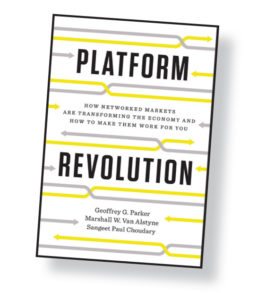Do you remember the first time you shopped at a mall? Essentially it was a medium at which you can meet buying needs through a variety of suppliers in a central location. A mall is a physical platform. A platform is simply a business model to facilitate value-creating interactions between producer supply and consumer demand. Platforms, like malls, that enable business transactions between buyers and sellers have existed for thousands of years.
Today’s technology advances have enabled a similar exchange, but thanks to recent technology advances, it’s not physical, but all done digitally—unleashing breakthrough business models.
I still remember the first time I used Uber. For the geek in me, it was a magical moment. This company did not own cars, did not have drivers as employees, and did not have assets in the local market. Yet, unlike hailing a taxi, it gave me access to transportation in my unique location, on demand, in real time. Uber, like Airbnb, Amazon, Facebook and many others, essentially provides the digital technology infrastructure, a seamless ecosystem of value-accretive suppliers and ease of use to facilitate a supply and demand exchange without necessarily owning the resources.
What Disruption Looks Like
 Platform Revolution: How Networked Markets are Transforming the Economy and How to Make Them Work for You, by Geoffrey Parker, Marshall Van Alstyne, and Sangeet Choudary (W.W. Norton, 2016), capsulizes this radical business model change. The book outlines the characteristics of a platform business, the disruptive impact advances in technology have on creating established business, and the future of this trend. It predicts that this innovation will continue to escalate, which industries are ripe for disruption, and how you can start to build your own platform business model. While the primary enabler is the digital technology, it’s much more; it’s about creating unique value in connecting supply and demand through a single solution.
Platform Revolution: How Networked Markets are Transforming the Economy and How to Make Them Work for You, by Geoffrey Parker, Marshall Van Alstyne, and Sangeet Choudary (W.W. Norton, 2016), capsulizes this radical business model change. The book outlines the characteristics of a platform business, the disruptive impact advances in technology have on creating established business, and the future of this trend. It predicts that this innovation will continue to escalate, which industries are ripe for disruption, and how you can start to build your own platform business model. While the primary enabler is the digital technology, it’s much more; it’s about creating unique value in connecting supply and demand through a single solution.
Given the target reading audience, you might ask, how big of a deal is this in healthcare? A big deal. It’s only going to get bigger. It’s fair to say it’s early in our innovation cycle and that since traditionally, healthcare has been a late technology and business model adopter, you have a limited window before your business gets disrupted. Organizations such as GE Healthcare, Kaiser, Welltok, Tictrac, SocialWellth, and many others are already pioneering radical innovation through platform models.
A special report from Accenture highlights an example of a future state: “Smarter platforms will be able to influence daily choices that impact your health and wellness. If you have asthma and track your symptoms, the platform can help identify when the pollen level could be a trigger. Instead of having your blood tested at a lab, a device connected to your mobile phone will be able to do a finger prick test and give you and your doctor immediate results.” Think about how this type of innovation will impact your business model and future offerings. The implications will be significant for all of us.
Technology is critical, but simply an enabler. You’ll create client value through relevantly differentiated offerings, a rich ecosystem of suppliers and partners, and an end-user experience that delights.
Take time now to think through how the platform revolution can help you win in the marketplace, or else remain stagnant at great peril. Consider yourself warned.





